[ad_1]
The shell that reamed the Russian troopers’ automobile scattered them in all instructions. One was face down on the asphalt, arms outstretched. One other was a mass of white and purple in barely-there fatigues. Warmth had singed the pores and skin of the third, and the fourth had been thrown 130 toes, touchdown in a discipline by the street, torso mangled, legs twisted backward.
The firefight between Ukrainian and Russian forces — it had been a three-vehicle group, together with an armored personnel provider and a Ural truck — erupted on E40, an 8000-mile trans-European freeway that threads its manner from France’s Calais to Kazakhstan, passing by means of this spot close to a roadside resort. It’s a 24-mile straight shot to the capital, Kyiv.
The battle ended Thursday morning. The cleanup started within the afternoon: A soldier directed visitors round bits of flesh, bone and metallic; a tank jerkily hauled a burnt-out armored personnel provider down the freeway; males off to the facet unloaded a truckload of huge caltrops. No person touched the corpses.
That is Ukraine now. Eight years of preventing over the nation’s breakaway Russian-backed jap area have morphed right into a vicious warfare for its existence. Kyiv is nearly encircled. Kharkiv, Ukraine’s second-largest metropolis, suffers a each day pummeling from shells and missiles. Swaths of the nation’s south have already fallen into Russian arms, as have components of the east. A nuclear plant has been attacked; Russian shells rain on civilians, lots of whom now sleep by the hundreds in basements and subways.
Greater than 1 million have been changed into refugees. There are fewer secure locations. The Ukrainian winter has turned to spring, however snow nonetheless falls by means of columns of smoke and over graves hurriedly dug.
A 500-mile drive by means of the nation to outrun the beginning of the Russian blitz — from Shchastia within the disputed Donbas area to Kharkiv and again to the capital — underscores not solely the challenges going through Moscow’s onslaught, but in addition the fee to Ukrainians grappling with the injuries of what had been for years known as a “frozen battle” earlier than it exploded final month and startled the world.
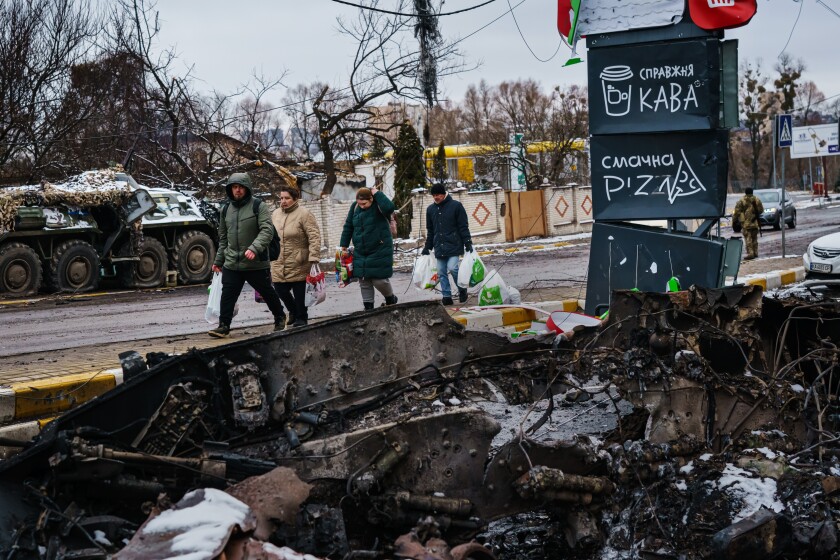
Residents carry provides throughout a debris-strewn street Tuesday in Irpin, Ukraine.
(Marcus Yam / Los Angeles Instances)
The obvious expression of these wounds had been in jap Ukraine. Driving by means of its cities and villages, one finds roads that simply finish.
Go down a avenue, take a flip and there’s a roadblock, a full-on safety barrier or a checkpoint with stern troopers admitting no passage. Past, only a few miles and a rising political chasm away, are the so-called Donetsk and Luhansk folks’s republics.
The 2 break-away states that Russian-backed separatists created in 2014 — and now the ostensible purpose for Moscow’s warfare on Ukraine — amputated two-thirds of the 2 provinces (informally often called the Donbas area) from the nation. Since then, Tania Nikolayevna, a pensioner in her sixties, has reckoned with that loss.
Earlier than the warfare, she lived in Luhansk metropolis, barely 10 miles away Shchastia, the place like most of the provincial capital’s residents she would come to her family-owned dacha right here. In 2014 it turned her everlasting residence. What was as soon as a 15-minute jaunt turned an hours-long trek, a passage Nikolayevna didn’t accomplish that a lot any extra. She hadn’t visited her grandmother’s grave again in Luhansk for 2 years.
Sporting a purple jacket and a white wool cap that framed her face, she stood together with her husband — in grey overalls, an ill-fitting down olive jacket and fine-dotted black-and-white cap — queueing by a properly, the place residents moved a lever to pump water into plastic jugs. Such rituals had turn into a lifestyle.
This was final month, again within the “will he or received’t he” section of Russian President Vladimir Putin’s plan to blitz into Ukraine with an estimated 190,000 troops. Those that thought he would invade surmised that he would fulfill himself with the declared borders of the Donetsk and Luhansk folks’s republics.
Shchastia was within the crosshairs. However Nikolayevna wouldn’t go.
“After all we’re fearful,” she stated. “However I’m afraid to go away as a result of I’ve nothing.”
Like many pensioners, she remembered higher instances, when this a part of the nation was the economic engine of Ukraine. The Donetsk and Luhansk oblasts cowl some 9% of the nation, however the warfare held 16% of the inhabitants in dense urbanized areas. Lots of them develop round sprawling industrial tasks such because the Luhansk energy station. However preventing crept in, and issues modified. An errant separatist shell had sheared some energy traces and broken it, authorities stated, disrupting electrical energy and water pumping stations.
Younger males had largely vanished from these cities, looking for alternative elsewhere after the warfare had denuded this space of financial life. For pensioners like Nikolayevna, whose finest years had been through the Soviet period, she reluctantly acknowledged that if the Russians got here, it will maybe be simpler: She would have the ability to go to her Luhansk metropolis once more, its reminiscence giving her voice a softer tone.
“It was lovely: beautiful parks, squares. However I additionally favored to stroll within the forest,” she stated. Now she was too afraid to go off-track “due to mines.”
And it didn’t matter to her if an individual spoke Ukrainian or Russian, a division that had turn into nearly a marker of loyalty. Most individuals in Shchastia spoke Russian, however Nikolayevna additionally “wished to listen to Ukrainian.”
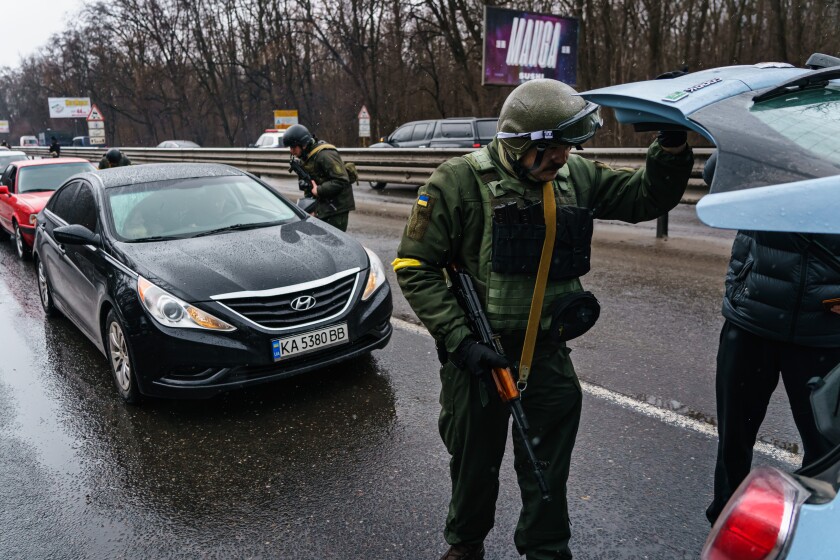
Troopers test autos at a checkpoint on a important street coming into Kyiv, Ukraine, on Wednesday.
(Marcus Yam / Los Angeles Instances)
“I don’t need these components to be separated,” she stated, trudging a bit lopsided from the jugs.
“We don’t care about cash or salaries. All we care about is peace.”
However a recent warfare got here on the chilly morning of Feb. 24. Shchastia, as soon as a crossing into the Luhansk Folks’s Republic, was subsumed by the Russians on the primary day of the offensive. Some who escaped sought sanctuary in Kharkiv, pondering that Ukraine’s second largest metropolis, lower than two dozen miles from the northern border with Russia, would maintain particular that means for Moscow.
In any case, they calculated, the bonds with Russia run deep: The town is essentially Russian-speaking, and plenty of have relations throughout the border. Traditionally, Kharkiv was the capital of Soviet Ukraine. When the pro-European protests ousted former Ukrainian President Viktor Yanukovych in 2014, there have been celebrations in Kyiv, however many in Kharkiv noticed it as a coup. At one level, it was thought separatists would attempt to set up one other pro-Russian breakaway enclave there.
These bonds had been examined however not damaged after the 2014 warfare. Many spoke of relations on the opposite facet. They resented Kyiv’s dictats on utilizing Ukrainian and demonizing the Russian language, feeling that the federal government was slicing one other hyperlink with these they known as brothers.
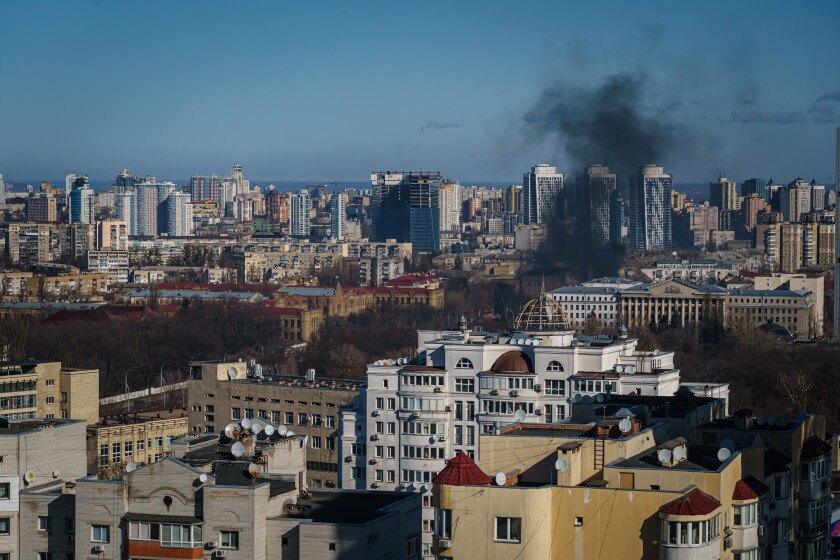
A smoke column rises after an assault in Kyiv on Saturday.
(Marcus Yam / Los Angeles Instances)
However none of it mattered to Moscow. In current days, Russia fired missiles into Kharkiv’s elegant squares and ornate authorities buildings, in scenes many stated had been paying homage to the town’s 1941 battle towards the Nazis. The ferocious Russian assaults perplexed Alexander, a 41-year-old martial-arts teacher from Kharkiv who gave solely his first title for causes of privateness.
“It’s as if it was to steer a metropolis, which was near them, that they’re invaders and aggressors,” he stated.
Alexander spent six days in a shelter together with his household earlier than braving his manner out of the town 20 minutes earlier than an airstrike. Passing by means of the checkpoints, he spoke Ukrainian, a language he’s much less comfy with than Russian.
“I responded in Ukrainian to keep away from any issues,” he stated.
“Certain, we’d change again after that to Russian, but it surely’s like a system, to find out when you’re pal or foe.”
Alexander would navigate a harmful, new world, and with information of Kharkiv being surrounded, others raced towards Kyiv. By some means, the web was nonetheless working. Google Maps confirmed a do-not-pass signal on just a few highways, however there nonetheless was a manner out.
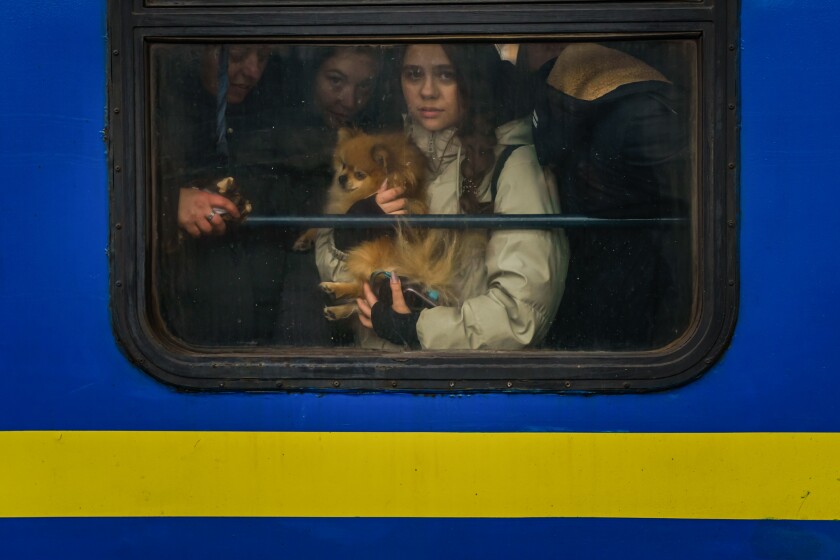
Ukrainian civilians pack a practice leaving Irpin, Ukraine.
(Marcus Yam / Los Angeles Instances)
It took hours, a touch by means of highways and pothole-scarred backroads that, when evening fell, had been illuminated solely by a dim lamp at a checkpoint or the blaze of the Russian navy truck torn in two by Ukrainian forces, a hearth crackling out of its heart.
Getting into Kyiv, the highways had been abandoned. Automobiles sprinted nervously, with any distant explosion turbocharging drivers to higher speeds.
For months, Kyiv, a metropolis of gold domes and a grand previous bisected by the Dnieper River, discovered itself within the eye of a geopolitical storm. The cliche is that the storm is calmest at its heart, and Kyiv had proven that, proper as much as the primary day of the invasion. The Friday earlier than it was, properly, Friday evening in a shabby however hip capital stuffed with hip bars and hip eating places now full of hordes of not-so-hip journalists quaffing hip-but-tasty cocktails alongside hip-looking Kyivites.
Sure, that they had skilled within the territorial protection power, and sure, that they had ready the weapons. However folks loved an evening out. Then the invasion started; rifles had been handed out to all who had been in a position, and do-it-yourself bombs had been bottled. And now with a Russian convoy dozens of miles lengthy ready 18 miles away, what has the capital turn into? A waypoint on a determined scramble? A metropolis on borrowed time? A trap-filled fortress with a military and ready-insurgents, its boulevards a trap-filled gantlet promising demise to all who move unpermitted?
Both manner, curfews descended. The warfare hadn’t totally entered Kyiv; it nonetheless remained calmest contained in the storm.
As a substitute, the violence was intense on the periphery, close to the Ukrainian troopers stationed on E40 and in Makariv, a village of 10,000 folks just a few miles nearer to Kyiv. On Wednesday, the Ukrainians clawed it again from Russian management, however solely simply — it remained surrounded on all sides, stated Julia, an English instructor for youngsters now turned translator for checkpoints.
The 27-year-old stated Ukrainian troops had pressured again a part of a Russian column to the close by fields and forests.
“They’re panicking. It was a really lengthy column, numerous tanks. Our military stopped them they usually’re now round our metropolis,” she stated to a sporadic snare-drum of cannon and artillery hearth within the background.
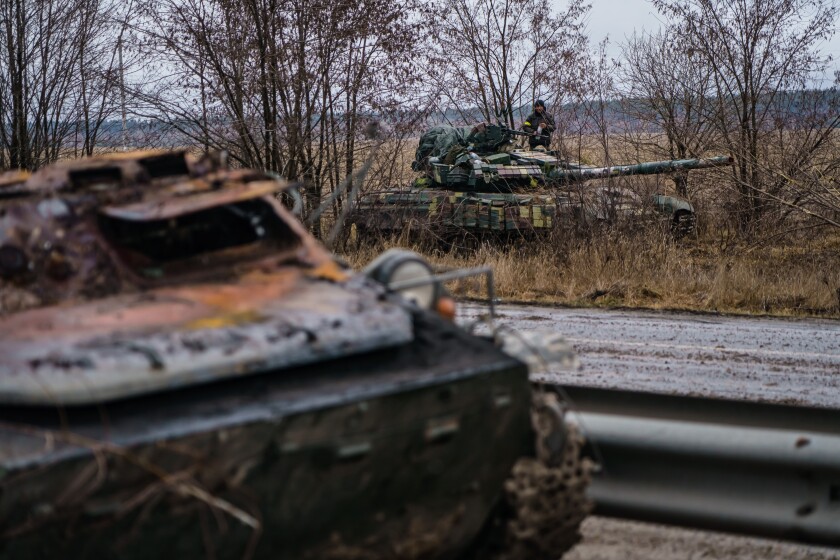
A Ukrainian tank driver stand prepared on a tank in a prepared place on a freeway close to Sytnyaky
(Marcus Yam/Los Angeles Instances)
Many others stated they had been decided to guard their houses. However Julia, who gave her first title for causes of security, gave a less complicated purpose why she and her husband had been nonetheless in Makariv: “We didn’t have time.”
She was terrified, particularly at evening. However everybody left within the village was working to repel the Russians. That included a person nicknamed Malina, an previous pensioner in an ancient-looking brown camouflage outfit, a toothless grin and bright-but-sad blue eyes. They didn’t appear anyplace close to sufficient to face the firepower behind them.
“We’re pushing them again,” Julia stated, “as a result of that is one other approach to Kyiv.”
Not far-off, and days later, the lifeless Russian troopers lay within the chilly, a touch of snow within the air. A battle had come and gone. Extra had been within the offing. The sounds nobody needs to listen to had been transferring nearer. A bit farther up the street lay a coronary heart with no physique. It was unclear from which soldier it had come.

